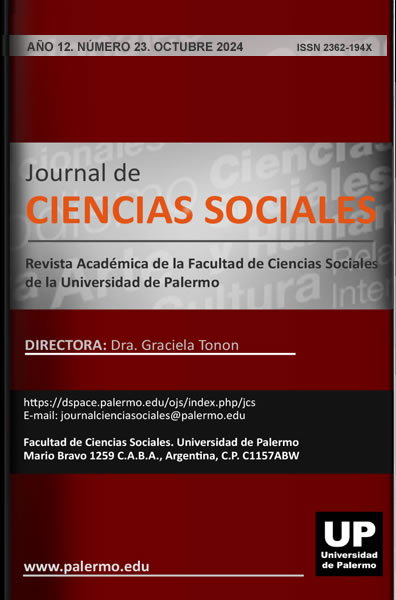Empowering youth in care: the case of emancipatory research with care leavers
Resumen
La nueva sociología de la niñez ha enfatizado que los/as niños/as son capaces de ser reflexivos, de tener un propósito e influir en el entorno en el que viven. Este concepto también se conoce como 'niños/as como agentes capaces', lo que significa que pueden moldear el entorno. A pesar de esto, a los/as niños/as rara vez se les da el espacio para participar. La falta de participación es particularmente evidente dentro del sistema de protección infantil, donde la tensión entre el derecho de los/as niños/as a la protección, y su derecho a la participación, se vuelve aún más pronunciada. Impedirles la participación no sólo es una violación de un derecho, sino que impacta en su capacidad de ejercer la ciudadanía social. Este artículo aborda estos temas presentando los hallazgos del proyecto de investigación-acción CarINg (Empowering Child Care Systems and Supporting Leaving Care from Inside), implementado en Italia y cofinanciado por la Unión Europea. La investigación profundizó en las oportunidades de participación para las personas egresadas del sistema de protección, con un doble enfoque en mejorar el sistema de protección alternativo local y empoderar a las personas que egresaron del sistema, para que expresen activamente sus opiniones. Los resultados muestran cómo la participación de aquellas personas que egresaron del sistema en la producción de conocimiento, puede empoderarlas como sujetos contribuyendo a generar cambios dentro del mismo sistema de cuidados alternativos. Que todos estos cambios sucedan depende de la capacidad de las instituciones para reconocer que los/as niños/as son auténticos/as agentes y participantes de la sociedad.
Descargas
Citas
Andersen, J. G., & Halvorsen, K. (2002). Changing labour markets, unemployment and unemployment policies in a citizenship perspective. In J. G. Anderson, J. Clasen, W. van Oorschot & K. Halvorsen (Eds.), Europe’s new state of welfare (pp. 1-20). Policy Press.
Atkinson, C., & Hyde, R. (2019). Care leavers’ views about transition: a literature review. Journal of Children's Services, 14(1), 42-58. https://doi.org/10.1108/JCS-05-2018-0013
Atwool, N. (2016). Journeys of exclusion: Unpacking the experience of adolescent care leavers in New Zealand. In P. Mendes & P. Snow (Eds.), Young People Transitioning from Out-of-Home Care: International Research, Policy and Practice (pp. 309-328). Palgrave Macmillan. https://doi.org/10.1057/978-1-137-55639-4_15
Ballet, J., Biggeri, M., & Comim, F. (2011). Children’s agency and the capability approach: A conceptual framework. In M. Biggeri, J. Ballet & F. Comim (Eds.), Children and the capability approach (pp. 22-45). Palgrave Macmillan. https://doi.org/10.1057/9780230308374_2
Barnes, M., & Prior, D. (2011). Co-production: Working with communities and service users in social care. The Policy Press.
Bessell, A. (2022). Rethinking child poverty. Journal of Human Development and Capabilities, 23(4), 539-561. https://doi.org/10.1080/19452829.2021.1911969
Biffi, E., Pippa, S., & Montà, C. C. (2023). Child participation in the protection system through the lenses of the capability approach. MeTis-Mondi educativi. Temi indagini suggestioni, 13(1), 289-302. https://www.metisjournal.it/index.php/metis/article/view/594
Biggeri, M., & Arciprete, C. (2022). Children as Capable Agents and Citizen: Empowering Children and Youth. In G. Tonon (Ed.), Social Justice for Children in the South (Vol. 9, pp. 157-175). Springer Nature. https://doi.org/10.1007/978-981-19-5045-2_9
Biggeri, M., Arciprete, C., & Karkara, R. (2019). Children and youth participation in decision-making and research processes. In D. A. Clark, M. Biggeri & A. A. Frediani (Eds.), The Capability Approach, Empowerment and Participation: Concepts, Methods and Applications, 193-221. Palgrave Macmillan. https://doi.org/10.1057/978-1-137-35230-9_8
Biggeri, M., & Ciani, F. (2019). Emancipatory research as empowerment: An illustration from a research study of persons with disabilities in Palestine. In D. A. Clark, M. Biggeri & A. A. Frediani (Eds.), The capability approach, empowerment and participation: Concepts, methods and applications (pp. 339-359). Palgrave Macmillan. https://doi.org/10.1057/978-1-137-35230-9_13
Biggeri, M., Comim, F., & Ballet, J. (2011). Final Remarks and Conclusions: The Promotion of Children’s Active Participation. In M. Biggeri, J. Ballet & F. Comim (Eds.), Children and the Capability Approach (pp. 340-345). Palgrave Macmillan. https://doi.org/10.1057/9780230308374_16
Butler-Kisber, L. (2008). Collage as inquiry. In J. G. Knowles & A. L. Cole (Eds.), Handbook of the Arts in Qualitative Research: Perspectives, Methodologies, Examples, and Issues (pp. 265-276). SAGE Publications.
Brady, E., & Gilligan, R. (2018). The life course perspective: An integrative research paradigm for examining the educational experiences of adult care leavers? Children and Youth Services Review, 87, 69-77. https://doi.org/10.1016/j.childyouth.2018.02.019
Cossar, J., Brandon, M., & Jordan, P. (2016). ‘You've got to trust her and she's got to trust you’: Children's views on participation in the child protection system. Child & Family Social Work, 21(1), 103-112. https://doi.org/10.1111/cfs.12115
Demetrio, D. (1999). Il gioco della vita: kit autobiografico. Guerini e Associati.
Dixon, J. (2016). Opportunities and challenges: supporting journeys into education and employment for young people leaving care in England. Revista Española de Pedagogía, 74(263), 13-29. https://rb.gy/8iloo
Glynn, N. (2021). Understanding care leavers as youth in society: A theoretical framework for studying the transition out of care. Children and Youth Services Review, 121. https://doi.org/10.1016/j.childyouth.2020.105829
Hall, K., & Janesick, V. J. (2014). Participatory visual and digital methods. In N. K. Denzin & Y. S. Lincoln (Eds.), The Sage Handbook of Qualitative Research (pp. 615-630). Sage Publications.
Hart, C. S., Biggeri, M., & Babic, B. (Eds.). (2014). Agency and participation in childhood and youth: International applications of the capability approach in schools and beyond. A&C Black.
Heimer, M., Näsman, E., & Palme, J. (2018). Vulnerable children's rights to participation, protection, and provision: The process of defining the problem in Swedish child and family welfare. Child & Family Social Work, 23(2), 316-323. https://doi.org/10.1111/cfs.12424
James, A. & Prout, A. (Eds.). (1997). Constructing and Reconstructing Childhood; Contemporary Issues in the Sociological Study of Childhood. The Falmer Press.
Kindon, S. (2003). Participatory video in geographic research: a feminist practice of looking? Area, 35(2), 142-153. https://www.jstor.org/stable/20004304
Lansdown, G. (2005). The evolving capabilities of the child. UNICEF Innocenti Research Centre. Florence, Italy, UNICEF.
Leeson, C. (2007). My life in care: Experiences of non‐participation in decision‐making processes. Child & Family Social Work, 12(3), 268-277. https://doi.org/10.1111/j.1365-2206.2007.00499.x
Lundy, L. (2007). ‘Voice’ is not enough: conceptualising Article 12 of the United Nations Convention on the Rights of the Child. British Educational Research Journal, 33(6), 927-942. https://doi.org/10.1080/01411920701657033
Melton, G. B. (2014). Strong communities for children: A community-wide approach to prevention of child maltreatment. In J. Korbin & R. Krugman (Eds.), Handbook of child maltreatment (pp. 329-339). Springer. https://doi.org/10.1007/978-94-007-7208-3_17
Mendes, P., & Snow, P. (Eds.). (2016). Young people transitioning from out-of-home care: International research, policy and practice. Springer. https://doi.org/10.1057/978-1-137-55639-4
Mendes, P., & Moslehuddin, B. (2004). Graduating from the child welfare system: A comparison of the UK and Australian leaving care debates. International Journal of Social Welfare, 13(4), 332-339. https://doi.org/10.1111/j.1468-2397.2004.00329.x
Mitchell, C. (2008). Taking a participatory turn: Participatory action research and participatory visual research. In N. K. Denzin & Y. S. Lincoln (Eds.), The Landscape of Qualitative Research (3rd ed., pp. 567-606). Sage Publications.
Needham, C. (2008). Realising the potential of co-production: Negotiating improvements in public services. Social policy and society, 7(2), 221-231. https://doi.org/10.1017/S1474746407004174
Nussbaum, M. (2011). Creating Capabilities: The Human Development Approach. Belknap Press.
O'Hare, L., Santin, O., Winter, K., & McGuinness, C. (2016). The reliability and validity of a child and adolescent participation in decision‐making questionnaire. Child: care, health and development, 42(5), 692-698. https://doi.org/10.1111/cch.12369
Oliver, M. (1997), Emancipatory Research: Realistic Goal or Impossible Dream. In C. Barnes and G. Mercer (Eds.), Doing Disability Research (pp. 15-31). The Disability Press, Leeds.
Pepe, A., Biffi, E., Montà, C., Arciprete; Biggeri, M. (2023, forthcoming), Agency, participation in decision making and wellbeing among care leavers in care system: A quantitative mediation study, Children and Youth Services Review,
Qvortrup, J. (1993). Societal position of childhood: The international project childhood as a social phenomenon. Childhood, 1(2), 119-124. https://doi.org/10.1177/090756829300100207
Robeyns, I. (2006). The capability approach in practice. The Journal of political philosophy, 14(3), 351-376. https://doi.org/10.1111/j.1467-9760.2006.00263.x
Sen, A. K. (1990). Justice: Means versus Freedom. Philosophy and Public Affairs, 19. 111-21. https://www.jstor.org/stable/2265406
Sen, A. K. (1999), Development as Freedom. Oxford University Press.
Stein, M. (2006). Research review: Young people leaving care. Child & family social work, 11(3), 273-279. https://doi.org/10.1111/j.1365-2206.2006.00439.x
Terzi, L. (2005). Beyond the dilemma of difference: The capability approach to disability and special educational needs. Journal of Philosophy of Education, 39(3), 443-459. https://doi.org/10.1111/j.1467-9752.2005.00447.x
van Bijleveld, G. G., Dedding, C. W., & Bunders‐Aelen, J. F. (2015). Children's and young people's participation within child welfare and child protection services: A state‐of‐the‐art review. Child & Family Social Work, 20(2), 129-138. https://doi.org/10.1111/cfs.12082
van Breda, A. D., Munro, E. R., Gilligan, R., Anghel, R., Harder, A., Incarnato, M., Mann-Feder, V., Refaeli, T., Stohler, R., & Storø, J. (2020). Extended care: Global dialogue on policy, practice and research. Children and Youth Services Review, 119. https://doi.org/10.1016/j.childyouth.2020.105596
Woodman, E., Roche, S., & McArthur, M. (2023). Children's participation in child protection—How do practitioners understand children's participation in practice?. Child & Family Social Work, 28(1), 125-135. https://doi.org/10.1111/cfs.12947
Other sources consulted
United Nations Convention on the Rights of the Child (UN-CRC) (1989).
United Nations Children's Fund (UNICEF) (2003). The State Of The World’s Children 2003. New York. https://www.unicef.org/reports/state-worlds-children-2003
SOS Children's Villages Position Paper (2017), Il diritto alla partecipazione nei percorsi di tutela minorile. Available here https://www.sositalia.it/getmedia/a6bf2623-86ae-4dbb-9af9-17a4297a5e01/Position-Paper-Diritto-alla-Partecipazione-in-tutela.pdf
Los autores conservan los derechos sobre su obra garantizando a esta revista el derecho de primera publicación, comprometiéndose a citar el Journal de Ciencias Sociales como referencia de la publicación original.
Los trabajos publicados en el Journal se publican bajo los términos que se indican en la Licencia de Creative Commons con la Atribución 4.0 Internacional (CC BY 4.0).




























